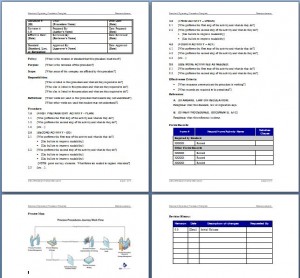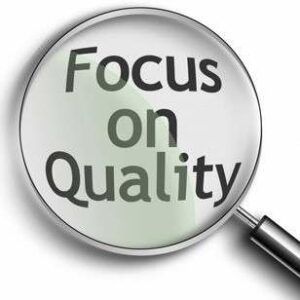What’s The Difference Between SOP GMP and Procedures?

SOP, GMP, and procedures: three vital components for efficiency and compliance in various industries. SOPs provide step-by-step instructions for tasks. GMP looks at guidelines and regulations for quality control during manufacturing. Procedures cover a broader range of activities. It’s key to understand these differences. What’s the difference between SOP, GMP, and procedures?
Understanding Standard Operating Procedures (SOPs)

MS Word Procedure Template
Standard Operating Procedures (SOPs) are vital. They give organizations a framework to do their daily tasks quickly and consistently. They are step-by-step instructions for employees.
SOPs standardize processes. They provide clear instructions on how to do tasks and ensure consistency. Especially important in industries where small errors can have huge consequences, e.g. pharmaceuticals.
GMP takes a holistic approach, focusing on quality control throughout the whole manufacturing process. It covers raw material sourcing, equipment maintenance, personnel training, hygiene practices, and more. Organizations must adhere to GMP to guarantee product safety and efficacy.
Procedures give guidance for broader activities such as maintenance or inventory management. They ensure consistency across departments and enable efficient coordination between teams.
Pro Tip: Develop effective SOPs, follow GMP guidelines, and implement well-defined procedures to enhance operational efficiency and maintain quality standards.
Here is a table about SOPs:
| SOP Definition | Purpose | Benefits |
|---|---|---|
| Explanation | SOPs define the way processes | – Consistency |
| should be performed | – Efficiency | |
| – Quality |
More details about SOPs:
- Ensure regulatory compliance.
- Decrease risk.
- Help train new employees.
A study by The British Journal of Psychology shows that SOPs can increase task performance and reduce errors.
What’s the difference between SOP, GMP, and Procedures? It’s like comparing a rock band, a boy band, and a cover band – they all have rules, but one will make you sing.
Exploring Good Manufacturing Practices (GMPs)
Exploring GMPs is essential for quality control and workplace safety in production. GMPs are a set of rules that outline the best practices for manufacturing. These include personnel, facilities, equipment, processes, and documentation.
To get and understanding of their importance, here’s a table:
| Aspect | Importance |
|---|---|
| Personnel | Qualified staff |
| Facilities | Clean and controlled environment |
| Equipment | Proper functioning and calibration |
| Processes | Standard procedures for consistency |
| Documentation | Comprehensive records for traceability |
GMPs are also important to prevent contamination, errors, or deviations from standard procedures. Adhering to these practices improves product quality and consumer trust.
Let me tell you a story to emphasize GMP importance. A pharma company faced multiple product recalls because of contamination issues due to inadequate cleaning. This made them realize how important it is to follow GMP guidelines. After robust cleaning and training on GMP compliance, the number of recalls decreased significantly.
GMPs are essential for manufacturers to ensure superior quality and consumer safety. Following these guidelines creates and environment where safe and reliable products can be consistently produced.
Differentiating Procedures from SOPs and GMPs
SOPs, GMPs, and procedures are all essential for industries striving for operational excellence. Here’s a breakdown of the key differences between them:
- SOPs are step-by-step processes for routine tasks. Their purpose is to ensure consistency and reduce errors.
- Procedures are instructions for achieving specific goals. They define best practices.
- GMPs are regulations and guidelines to guarantee product quality and safety.
These elements are vital for organizations to implement, in order to maximize efficiency and compliance. It is important to understand the nuances between these three concepts in order to maintain industry standards and ensure consistent quality.
Make sure you don’t miss out! Enhance your knowledge, boost work performance, and achieve professional excellence by understanding these fundamentals. Let SOPs, GMPs, and procedures be your guide towards success in your industry.
The Role of SOPs, GMPs, and Procedures in Quality Management
SOPs, GMPs, and procedures are key in quality management. They guarantee regularity, conformity with regulations, and following of best practices. Let’s have a look at their roles with real data in and informative yet succinct way.
| SOPs | GMPs | Procedures | |
|---|---|---|---|
| Definition | Standard Operating Procedures | Good Manufacturing Practices | Detailed step-by-step guidelines |
| Purpose | Ensure consistent processes and outcomes | Maintain product safety and quality standards | Outline specific actions for achieving desired results |
| Examples | Equipment calibration | Cleaning validation | Document control |
| Batch record keeping | Training requirements | Change control |
This table reveals the distinct roles of each element in quality management. SOPs give detailed instructions for consistent processes and outcomes. GMPs concentrate on maintaining product safety and adhering to quality standards. Lastly, procedures state specific actions to achieve desired results.
It’s also worth pointing out something not mentioned yet. While SOPs are usually company-specific and may differ between organizations, GMPs are regulatory requirements applicable to the pharmaceutical industry generally. Whereas, procedures can be tailored to particular tasks within and organization.
To optimize quality management, companies need to implement effective SOPs, stick to GMPs, and follow relevant procedures in their operations. This way, they can ensure consistent processes, maintain product safety and quality standards while still getting desired outcomes.
Combining SOPs, GMPs, and procedures is like trying to juggle a chainsaw, a flaming torch, and a live grenade – and absolute no-no if you want to stay alive!
Implementing and Maintaining SOPs, GMPs, and Procedures
Implementing and maintaining SOPs, GMPs, and procedures is very important for organizations. Let’s look at their features.
SOPs (Standard Operating Procedures)
- Are documented instructions for tasks or processes.
- Provide a standard approach for routine activities.
GMPs (Good Manufacturing Practices)
- Are regulations and guidelines.
- Ensure quality and safety in production.
Procedures
- Are step-by-step instructions.
- Are more flexible than SOPs and GMPs.
To conclude, having and following SOPs, GMPs, and procedures can help ensure efficiency, compliance, and consistency in operations.
Difference Between SOP GMP and Procedures

Writing Standard Operating Procedures
SOP, GMP, and Procedures are all essential components for quality and compliance in various industries. Although they have similar aims, there are distinct differences between them.
SOP stands for Standard Operating Procedure. It is a set of instructions that show how to do specific tasks and processes. It ensures safety, compliance, and efficiency in and organization.
GMP stands for Good Manufacturing Practices. It has guidelines and regulations to ensure the quality and safety of manufactured products. It is significant in sectors like pharmaceuticals and food manufacturing.
Procedures are detailed instructions for particular tasks. They can be a part of SOPs or GMPs and provide more info on executing activities. Procedures may be easy or complex, but they help to guarantee accuracy and consistency in completing tasks.
Organizations could improve effectiveness by:
- Training: Do comprehensive training sessions for employees on SOPs, GMPs, and procedures.
- Documentation: Regularly review and update documentation.
- Audits and Inspections: Implement routine checks to evaluate compliance.
These suggestions will help organizations develop a framework that meets industry regulations, while promoting efficiency and quality control. It is important to understand the distinctions between SOP, GMP, and procedures for businesses wanting to excel in their processes.
This will bring productivity and customer satisfaction. Don’t forget that references are key when dealing with SOPs, GMPs, and procedures. Utilizing up-to-date sources will keep businesses ahead. Making use of reliable references will improve performance and guarantee quality control. It’s the way to success!
Frequently Asked Questions

Q: What is the difference between SOP, GMP, and Procedures?
A: SOP stands for Standard Operating Procedure, GMP refers to Good Manufacturing Practice, and Procedures are a set of established steps or actions to be followed. While they serve similar functions, there are distinctions between these terms.
Q: What is a Standard Operating Procedure (SOP)?
A: A Standard Operating Procedure (SOP) is a detailed, step-by-step set of instructions that outlines how to perform a specific task. It ensures consistency, quality, and safety in operations within and organization. SOPs are often used in industries where precision and adherence to specific guidelines are crucial.
Q: What is Good Manufacturing Practice (GMP)?
A: Good Manufacturing Practice (GMP) refers to a set of regulations and guidelines that ensure the quality, safety, and consistency of products in the manufacturing industry, particularly in the production of pharmaceuticals, medical devices, and food. GMP compliance helps in minimizing risks during the manufacturing process.
Q: Are SOPs and Procedures the same?
A: While there is some overlap between SOPs and procedures, they are not exactly the same. SOPs are more detailed and specific, providing step-by-step instructions for completing a task. Procedures, on the other hand, are broader documents that outline a series of actions or steps required to achieve a particular outcome.
Q: Are GMPs and SOPs mandatory?
A: GMPs are mandatory regulations imposed by regulatory authorities, such as the Food and Drug Administration (FDA) in the United States, to ensure the safety and quality of manufactured products. SOPs, though not always mandatory, are recommended in regulated industries to maintain consistency and control in operations.
Q: How are SOPs and GMPs related?
A: SOPs play a crucial role in achieving GMP compliance. SOPs provide clear instructions on how to perform tasks according to GMP regulations. They outline specific procedures, responsibilities, and measures to maintain quality control, ensuring that GMP standards are met during manufacturing processes.
















Leave a Reply